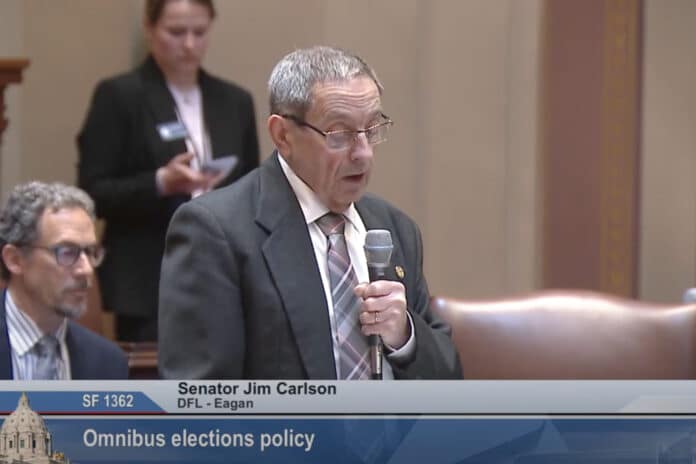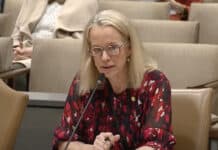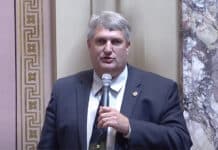
DFLers in the Minnesota House and Senate voted this month to transform American presidential elections by abandoning the Electoral College.
The Senate voted along party lines, 34-33, on Wednesday to pass an elections omnibus policy bill that includes a provision that would have Minnesota award its presidential electors to the candidate with the most votes nationwide. Republicans unsuccessfully tried to remove that language from the bill.
Last week the House passed an omnibus state government bill that included the national popular vote compact language. Because that language is included in two different omnibus bills, a series of Democrat controlled conference committees between the chambers will likely determine the fate of the measure.
Minnesota would join 15 other states in the National Popular Vote Interstate Compact, and take the nation one step closer to electing the president by a national popular vote. It’s a departure from the long-standing Electoral College system, which has states award their allotted electoral votes based on the outcome of their individual statewide presidential elections. The national popular vote compact would have states who sign on award their electoral votes to the winner of the total votes accumulated across all 50 states and the District of Columbia.
Is it one national election, or 51 separate elections?
The National Popular Vote Interstate Compact would go into effect after states comprising a majority of electoral votes, 270 out of 538, have signed on to the agreement. Minnesota’s 10 electoral votes would bring the number to 205.
State legislatures that have already signed onto the national popular vote compact include: Hawaii, Oregon, Washington, California, Colorado, New Mexico, Illinois, Maryland, Delaware, New Jersey, New York, Connecticut, Rhode Island, Massachusetts, and Vermont. The District of Columbia has also signed onto the compact.
Sen. Mark Koran, R-North Branch, who called the national popular vote compact “extremely controversial,” offered an amendment on the Senate floor that would have deleted the national popular vote provision from the elections omnibus bill, SF1362. That amendment failed on a party-line vote, with all 34 DFLers voting to keep the provision in the bill, one more than the 33 Republicans who voted to remove it from the bill.
“We should not be selling off or changing our election laws that are disrespectful to the will of the people of Minnesota,” Koran said. “We want to make sure our votes are cast and counted towards the intent of our voters, which are based on the outcome of Minnesota’s elections. Not the east coast or the west coast of the United States.”
DFL legislators who support the national popular vote measure say there’s nothing controversial about determining the nation’s president by popular vote.
“This is simply saying that we agree to enter a compact that at its heart, at its premise, has the notion that the person who gets the most votes should win,” said Sen. Bonnie Westlin, DFL-Plymouth. “That’s how democracy should work. That’s how we should be electing people.”
But Republicans contend that the Founders’ intent was to ensure each of the states in the union has a voice in selecting the president.
“I’m concerned that if you had a presidential candidate who wins a popular vote with a plurality, but way less than a majority of the votes cast, they could still be elected president under this bill,” said Sen. Jordan Rasmusson, R-Fergus Falls.
Sen. Andrew Mathews, R-Princeton, mentioned that 13 of those 15 states that passed legislation to sign onto the compact are where a Democrat “trifecta” exists — Democrat controlled House and Senate and a Democrat governor. He also accused the DFL legislative majority and Gov. Tim Walz of abandoning long-standing tradition in Minnesota of only enacting election reform bills that have bipartisan support. Walz previously told media in 2019 that any election reform bills that come to his desk need bipartisan support before he would sign them into law.
“If you are going to have a drastic change in the electoral system, then you need buy in from all across the spectrum,” Mathews said. “Governors of both parties in this state used to say we need to have bipartisan agreement from both Republicans and Democrats before we change our election law. That used to be the case until 2023 when Democrats took a full ‘trifecta.’ And here we are passing a one-sided, partisan bill.”
Hank Long
Hank Long is a journalism and communications professional whose writing career includes coverage of the Minnesota legislature, city and county governments and the commercial real estate industry. Hank received his undergraduate degree at the University of Minnesota, where he studied journalism, and his law degree at the University of St. Thomas. The Minnesota native lives in the Twin Cities with his wife and four children. His dream is to be around when the Vikings win the Super Bowl.
















